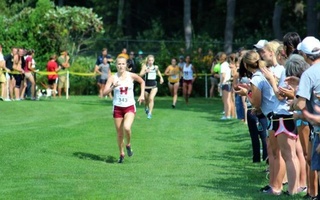She adds that while there is an additional “Sex Signals” performance for BGLTQ-identified students, she thinks the programming is inadequate.
“[The BGLTQ followup] sort of sucks because you have to be out if you want to go to it,” she says.
Jenkins—who has been at Harvard for seven years—says the administration has been taking measures to create a supportive environment for queer students.
“I’ve been pretty encouraged by what seems to be to be a reinvigorated conversation about how we support this community,” Jenkins says.
But, he stipulates that it is important for Harvard to create a safe environment for people who have not yet come out. He also warns about the danger of homophobic language and discriminatory practices.
“While [homophobic] words are unacceptable to begin with, you may be committing a type of violence against someone you care about,” he says.
A SKEWED VIEW
De Sa e Silva says that he does not think being gay at Harvard accurately represents the broader public’s perspective on the gay, lesbian, bisexual, and transgender community—meaning students must face different perceptions when they return home.
“I think Harvard gives me a skewed view of how accepting people are, maybe because the queer community here is so visible and I think fairly accepted,” he says.
Hannah, a member of the Class of 2015 who identifies as bisexual, says she is not active in BGLTQ groups on campus because she does not want her sexuality to define her.
Hannah, whose name has been changed to protect her identity because of the sensitive nature of the topic, says she fears that people will discriminate against her if she is too open about being bisexual. She says that despite the existence of queer-straight alliances, there is still a lot of discrimination against the BGLTQ community outside of Harvard, especially in places like Texas—where Hannah is from.
“Depending on what kind of job I have, I probably will not fully come out,” she says. “It could cause some strangeness.”
For students such as Hannah, coming out to their families might be more difficult than coming out on campus.
Aside from telling her brother she is bisexual, Hannah has not come out to her family, which she describes as conservative and Hispanic.
“People in Texas are generally more conservative, and especially Hispanic parents can be pretty conservative, so I think that really influences their decision making and their thoughts on gayness,” she says.
Read more in News
Harvard Leads Green Challenge with $12 MillionRecommended Articles
-
 Senior Stuns Field in First Collegiate Race
Senior Stuns Field in First Collegiate Race -
Disparate Results for Men, Women at Cross Country Dual MeetLeading up to Friday’s annual Harvard-Yale dual cross country meet, it appeared as if neither school held a significant advantage over the other. With the Crimson and the Bulldogs near each other in the rankings, few expected either to pull off a resounding victory.
-
Cross Country Races at HepsIn its most important meet of the season, the Harvard cross country team turned in a strong performance against its Ancient Eight rivals. At the Heptagonal Championships, held at Princeton’s West Windsor Fields, the Crimson women finished in a tie with Brown for third place, while the men earned a fifth-place finish.
-
 Sky Falls. Bond Franchise Okay.
Sky Falls. Bond Franchise Okay. -
Cross Country Season RecapSeason at a glance.
-
Harvard Alum Describes Experience with Domestic ViolenceSteiner, a businesswoman, author, and journalist, discussed her experience with domestic violence with Harvard community members on Tuesday evening.













